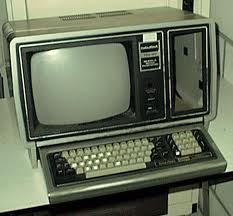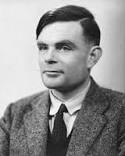
I had a customer in my store the other day and we started talking about when computers first became available to the public back in the early 80's and where the technology came from. Computers are doing just about everything now, they help control our TV's, radios, cars, planes and the surveillance camera's that are on every street corner. They have just about rendered the printing press obsolete, and the printing presses that are working are now controlled by computers. We read using a computer, we do our mathematical equations using computers and we tell time using a digital watch. So where did this all begin?
In 1912 the word computer referred to people (typically women) using pencil and paper or adding machines in the course of their work. In the same year  Alan Turing was born, who is considered by many to be the father of computer science. No one did more than Alan Turing to build the foundation of computer science, in 1936 he published a paper describing the principle behind all of today's computing devices, sketching out the theoretical blueprint for a machine that would be able to implement instructions for making any calculation. Turing did not invent the idea of a computer, Charles Babbage had plans for a computing machine a century earlier. George Boole developed the underlying binary mathematics that was originally conceived by Gottfried Leibniz that was adopted by the modern day computer. What set Turing apart and the reason he is considered the father of computer science is he combined the ideas from abstract mathematical theory and concrete mechanical computation to describe precisely how, in principle, machines could emulate the human brain's capacity for solving mathematical problems.
Alan Turing was born, who is considered by many to be the father of computer science. No one did more than Alan Turing to build the foundation of computer science, in 1936 he published a paper describing the principle behind all of today's computing devices, sketching out the theoretical blueprint for a machine that would be able to implement instructions for making any calculation. Turing did not invent the idea of a computer, Charles Babbage had plans for a computing machine a century earlier. George Boole developed the underlying binary mathematics that was originally conceived by Gottfried Leibniz that was adopted by the modern day computer. What set Turing apart and the reason he is considered the father of computer science is he combined the ideas from abstract mathematical theory and concrete mechanical computation to describe precisely how, in principle, machines could emulate the human brain's capacity for solving mathematical problems.
"What he had done was to combine.....a naive mechanistic picture of the mind with the precise logic of pure mathematics" according to his biographer, Andrew Hodges. Turing believed that people were machines, that the brain's magic was nothing more than physics and chemistry "computing" thoughts and behaviors. From this concept came the "Turing Test" which involves a human posing questions to an unseen respondent, either another human or a computer programmed to pretend to be human. If the computer succeeds in deceiving the interrogator, then by Turing's criteria, it qualifies as intelligent. Since then this test has inspired generations of computer scientists to make their machines smart enough to defeat chess grandmasters and embarrass humans on Jeopardy!. Today you can talk to your smartphone and get responses sufficiently human like to see that Turing was on to something. Turning even predicted a scenario similar to something you might see today on a TV commercial. "One day ladies will take their computers for walks in the park and tell each other "My little computer said such a funny thing this morning!" he liked to say. For Turing to say and envision such a scenario in the 1950's is astounding.
Turing studied mathematics at Cambridge University and subsequently taught there in Quantum mechanics. It was at Cambridge that he developed the proof which states that automatic computation cannot solve all mathematical problems. He was not the first to figure this out but Turing's triumph was not in the priority of his claim but rather in the creative way his proof was constructed which was by inventing his computer. He did not actually build a computer at first but rather he conceived a computational machine in his imagination and outlined the essential principles by which it would work so as to explore the limits of mathematics. This was the beginning of computer science as we now know it.
In 1938, Turing began to work secretly part-time for the British cryptanalytic department, the Government Code and Cypher School, which turned into a full time position at the outbreak of World War II. He became the key scientist in that government's code-breaking team. His work on cracking the German Enigma code was a secret at the time but later was widely recognized as instrumental in the Allies' defeat of Germany. After the war Turing returned to computer science, eventually developing software for a sophisticated (for the time) programmable computer at the University of Manchester. Turing seemed to have the ability to see the profound link between the symbolisms of mathematical abstraction and the concrete physical mechanisms of computations. He could see how computers could mimic the thought and intelligence previously only associated with biological beings. From these insights sprang an industry that has invaded all other industries and an outlook that has changed the course of civilization
Even with all of his achievements and gifts to society, the ugly head of prejudice reared up. During a police investigation of a break-in at Turing's home, he acknowledged that he knew the culprit's accomplice from a homosexual encounter he had. Being a homosexual at that time in Britain was a criminal offense.Turing then became the criminal and prosecuted for "gross indecency". During those times if you were convicted of this crime, you had a choice between going to prison or choosing chemical castration by injections of oestrogen which lasted for a year. Turing chose the injections. His security clearance was revoked because homosexuals were considered a security risk as they were open to blackmail.
Two years later Turing's house cleaner found him dead in bed, a partly eaten apple at his bedside. It was officially ruled a suicide by cyanide. At the age of 41, the man who played the starring role in saving Western democracy from Hilter became the victim of a more disguised form of evil.
Hodges wrote in his biography "He was the Galileo of science"
Wasn't Galileo persecuted by the church for being a heretic?

